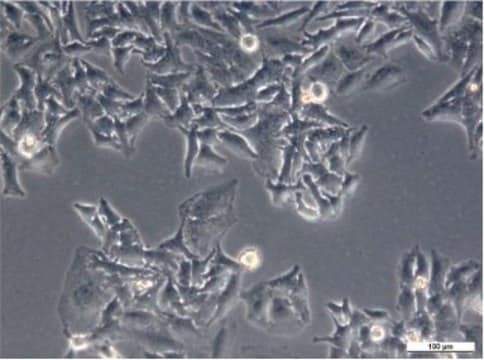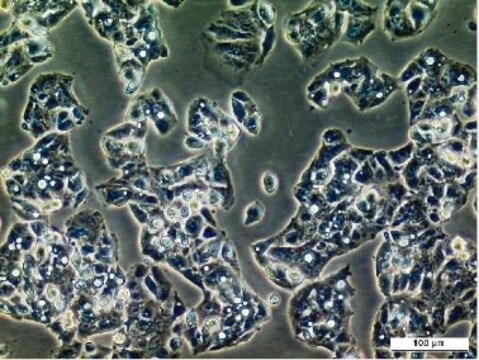RPMI 2650
88031602, human nose, Epithelial
Synonim(y):
RPMI Cell Culture Medium
About This Item
Polecane produkty
product name
RPMI 2650, 88031602
pochodzenie biologiczne
human nose
tryb wzrostu
Adherent
kariotyp
2n = 46
morfologia
Epithelial
produkty
Mucoid material
receptory
Not specified
metody
cell culture | mammalian: suitable
powiązane choroby
cancer
Warunki transportu
dry ice
temp. przechowywania
−196°C
Pochodzenie linii komórkowej
Opis linii komórkowej
Zastosowanie
Profil DNA
CSF1PO: 9,11
D13S317: 11,12
D16S539: 11,12
D5S818: 12,13
D7S820: 8,11
THO1: 6,8
TPOX: 8
vWA: 16,18
pożywka hodowlana
Rutyna subkultury
Inne uwagi
Certyfikaty analizy (CoA)
Poszukaj Certyfikaty analizy (CoA), wpisując numer partii/serii produktów. Numery serii i partii można znaleźć na etykiecie produktu po słowach „seria” lub „partia”.
Masz już ten produkt?
Dokumenty związane z niedawno zakupionymi produktami zostały zamieszczone w Bibliotece dokumentów.
Produkty
DNA, RNA, cDNA derived from ECACC mammalian cell lines allow screening for genes or expression patterns to identify lines most suitable for specific research.
Nasz zespół naukowców ma doświadczenie we wszystkich obszarach badań, w tym w naukach przyrodniczych, materiałoznawstwie, syntezie chemicznej, chromatografii, analityce i wielu innych dziedzinach.
Skontaktuj się z zespołem ds. pomocy technicznej




